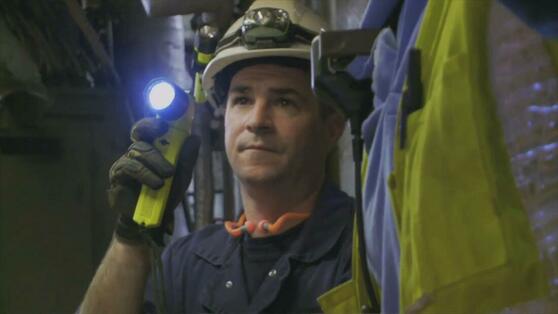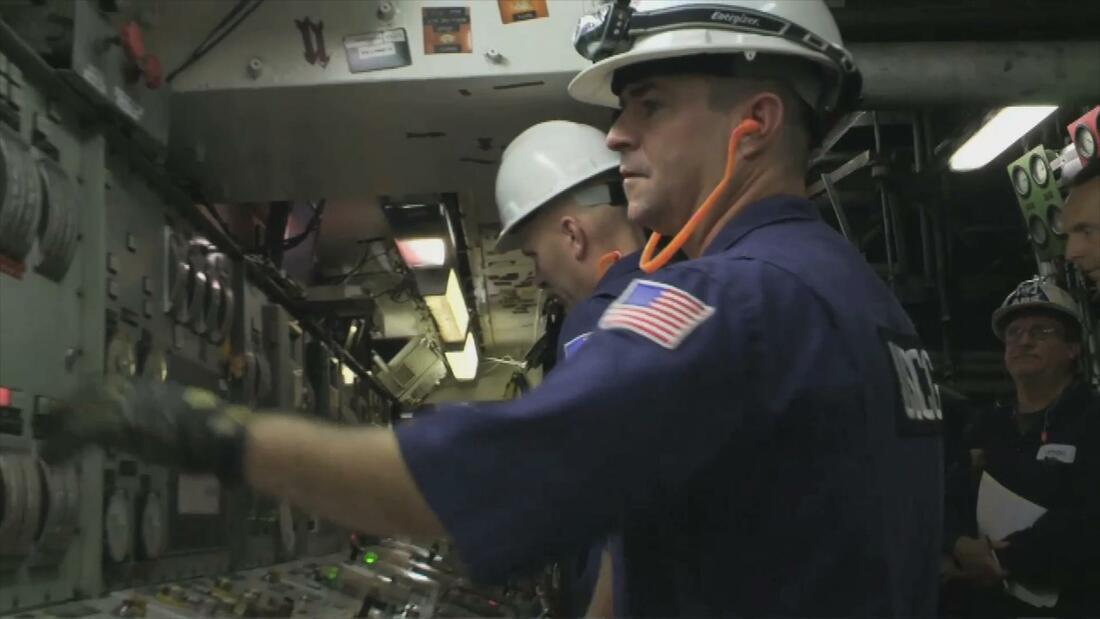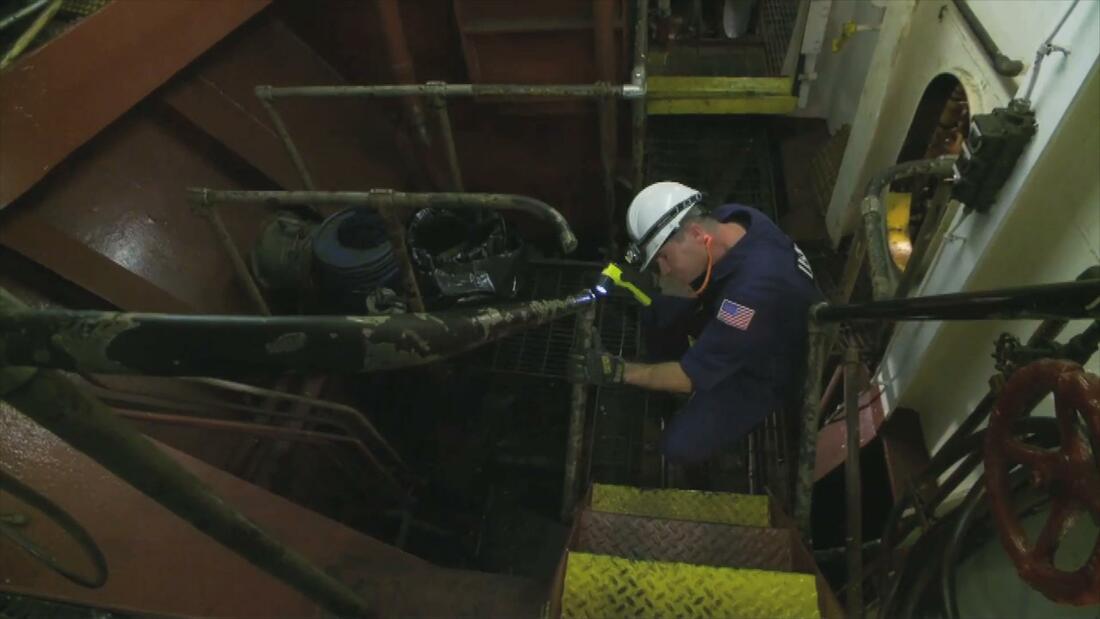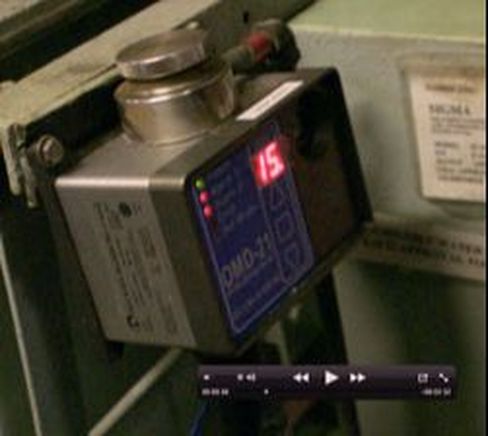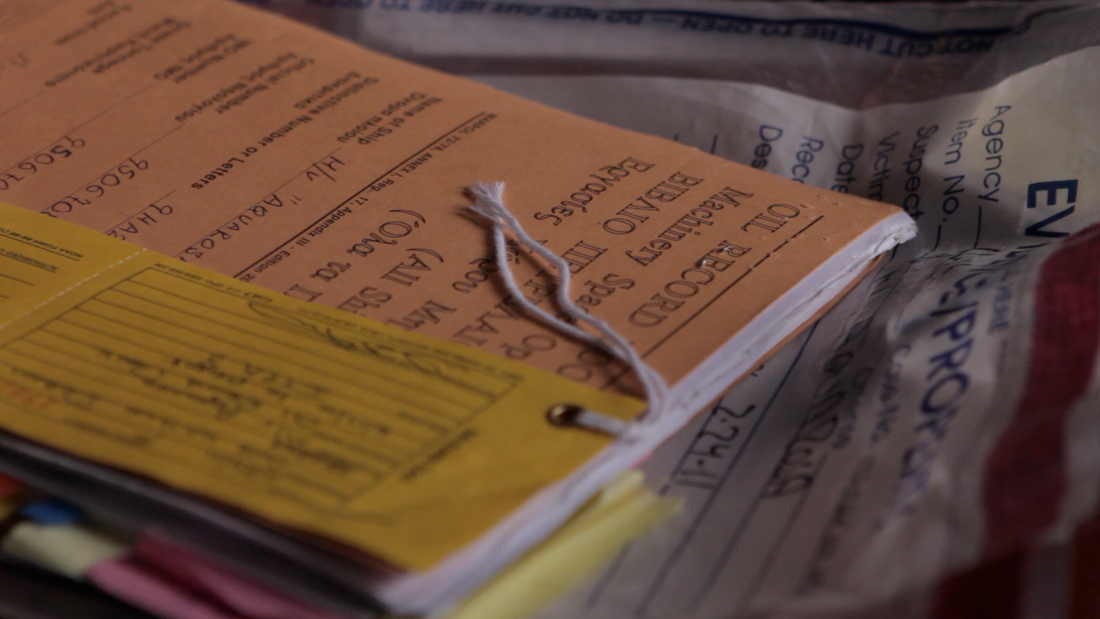A Coast guard inspector
|
“Our job is to make sure that vessels are following the law,” says Marine Defender James Kline, a Marine Safety Specialist with the US Coast Guard’s Marine Inspections Division at Sector New York. “Unfortunately, there are people out there that still illegally dump oil overboard. It’s my job to stop it.” “The main law that we’re out there enforcing is MARPOL, which is a convention to prevent oil pollution in the water.” |
THE INSPECTION
“We go out and do inspections every day," says Kline. "We're looking at everything that has to do with oil: how it's taken on, how it's transferred, how it's taken off the vessel or discharged off the vessel."
"Some of the first things that we'll start with is the documentations: certificates, paperwork type items. We're going to make sure they're all valid, they've been endorsed and everything is squared away."
“We go out and do inspections every day," says Kline. "We're looking at everything that has to do with oil: how it's taken on, how it's transferred, how it's taken off the vessel or discharged off the vessel."
"Some of the first things that we'll start with is the documentations: certificates, paperwork type items. We're going to make sure they're all valid, they've been endorsed and everything is squared away."
The Oil Record Book
“MARPOL requires mariners to track all oil, every drop, from the time it comes on the vessel till the time it comes off the vessel," says Kline. This tracking takes the form of an Oil Record Book which records the origin and fate of all the oil onboard the ship.
"The Oil Record Book is a log of where and when they take oil on board, and when they transfer oil, even if it's on the ship, or sent off the ship to somewhere else," says Kline. "We will look at the Oil Record Book and kind of match it up and make sure that it's staying within the parameters of the operating equipment. Inconsistencies in Oil Record Book is one of numerous red flags that would get us to start looking a little deeper into what's going on with regards to filtering oil, and getting rid of oil on the boat. Of course, with a well-kept book, if somebody's being accused of intentionally dumping oil, they can prove that they haven’t done anything wrong. Or, if they can't, then it gets looked at a little closer."
“MARPOL requires mariners to track all oil, every drop, from the time it comes on the vessel till the time it comes off the vessel," says Kline. This tracking takes the form of an Oil Record Book which records the origin and fate of all the oil onboard the ship.
"The Oil Record Book is a log of where and when they take oil on board, and when they transfer oil, even if it's on the ship, or sent off the ship to somewhere else," says Kline. "We will look at the Oil Record Book and kind of match it up and make sure that it's staying within the parameters of the operating equipment. Inconsistencies in Oil Record Book is one of numerous red flags that would get us to start looking a little deeper into what's going on with regards to filtering oil, and getting rid of oil on the boat. Of course, with a well-kept book, if somebody's being accused of intentionally dumping oil, they can prove that they haven’t done anything wrong. Or, if they can't, then it gets looked at a little closer."
"We'll also talk to the chief engineer a little bit, or the second engineer, depending who's in charge of running that equipment, and we'll get some basic information to make sure they have a good understanding of the equipment and that they know how to operate it," says Kline.
"Then we'll actually go down and do a visual inspection of the equipment and have them do an operational test. That gives us a lot of information. That tells us whether or not they understand their equipment, if they know how to use it, and if it's operating correctly. If it's not operating correctly, then we got to figure out what's wrong with it."
"Whenever you find something wrong, whether it's the alarm system or the piece of equipment's not operating correctly, it's not against the law for that stuff not to work. They just can’t discharge any oil through that system. And we recommend that they take a look at it, find out what the problem is and fix that equipment prior to using it."
"It's also another red flag for us. When the equipment doesn’t operate correctly, then you have to start looking at the record book a little more closely to see how much they’ve been discharging and the last time they did a discharge. How much they retained on board? And then we might go as far as sounding some tanks to see if their levels in the tank match what’s in the record book for retention."
"Then we'll actually go down and do a visual inspection of the equipment and have them do an operational test. That gives us a lot of information. That tells us whether or not they understand their equipment, if they know how to use it, and if it's operating correctly. If it's not operating correctly, then we got to figure out what's wrong with it."
"Whenever you find something wrong, whether it's the alarm system or the piece of equipment's not operating correctly, it's not against the law for that stuff not to work. They just can’t discharge any oil through that system. And we recommend that they take a look at it, find out what the problem is and fix that equipment prior to using it."
"It's also another red flag for us. When the equipment doesn’t operate correctly, then you have to start looking at the record book a little more closely to see how much they’ve been discharging and the last time they did a discharge. How much they retained on board? And then we might go as far as sounding some tanks to see if their levels in the tank match what’s in the record book for retention."
THE MAGIC PIPE
"From my experience, the most common form of cheating with regards to illegally dumping oil over the side of a vessel is what we call a magic pipe," says Coast Guard Marine Safety Specialist James Kline.
"This magic pipe can be any kind of vessel that will transport oil directly from a holding tank or a bilge, right around the oily water separating equipment right into the ocean. It could be a flexible hose. It could be a hard pipe that they made and it'll have oil coming out of it.”
“It's a very hard thing to find, the all elusive magic pipe," Kline explains. "But sometime you might get lucky and there might be a crewman onboard that would tip you off and lead you to it.”
"From my experience, the most common form of cheating with regards to illegally dumping oil over the side of a vessel is what we call a magic pipe," says Coast Guard Marine Safety Specialist James Kline.
"This magic pipe can be any kind of vessel that will transport oil directly from a holding tank or a bilge, right around the oily water separating equipment right into the ocean. It could be a flexible hose. It could be a hard pipe that they made and it'll have oil coming out of it.”
“It's a very hard thing to find, the all elusive magic pipe," Kline explains. "But sometime you might get lucky and there might be a crewman onboard that would tip you off and lead you to it.”
“If we find something, we’re going to start building a case at that point," says Kline. "We'll call in our investigating officers and they’re going to have their own set of questions. They’re going to start interviewing crew. We’re going to look at things more closely.”
DON'T DO IT
“Coast Guard Inspectors are kind of like the workhorse of the system," says Kline. "We understand the equipment, we understand the process, we understand the laws that are in place. The investigating officers, they know how to lead it from a civil penalty to a criminal penalty. It’ll go from us, to our Coast Guard inspecting investigators, and then, possibly, to the state district attorney.”
“Every oil has a unique fingerprint so we could actually match that up between the magic pipe, a tank, an overboard discharge. So we're going take all that evidence, we're going collect it and we're going try and match it up. If we match it up its prison time for someone.”
"If I had a message for mariners out there of the world, with regards to oil pollution, it would be: "Don’t do it,” says Kline. Be responsible. Treat our environment with respect. If you like prison go ahead and dump oil on the water. If you don’t like prison, don’t do it.”
“If you see something that’s wrong, something that’s not right, somebody that’s doing something they shouldn’t do, call us. Call the Coast Guard. We’ll take care of it.”
James Klein was interviewed in December 2005
“Coast Guard Inspectors are kind of like the workhorse of the system," says Kline. "We understand the equipment, we understand the process, we understand the laws that are in place. The investigating officers, they know how to lead it from a civil penalty to a criminal penalty. It’ll go from us, to our Coast Guard inspecting investigators, and then, possibly, to the state district attorney.”
“Every oil has a unique fingerprint so we could actually match that up between the magic pipe, a tank, an overboard discharge. So we're going take all that evidence, we're going collect it and we're going try and match it up. If we match it up its prison time for someone.”
"If I had a message for mariners out there of the world, with regards to oil pollution, it would be: "Don’t do it,” says Kline. Be responsible. Treat our environment with respect. If you like prison go ahead and dump oil on the water. If you don’t like prison, don’t do it.”
“If you see something that’s wrong, something that’s not right, somebody that’s doing something they shouldn’t do, call us. Call the Coast Guard. We’ll take care of it.”
James Klein was interviewed in December 2005
